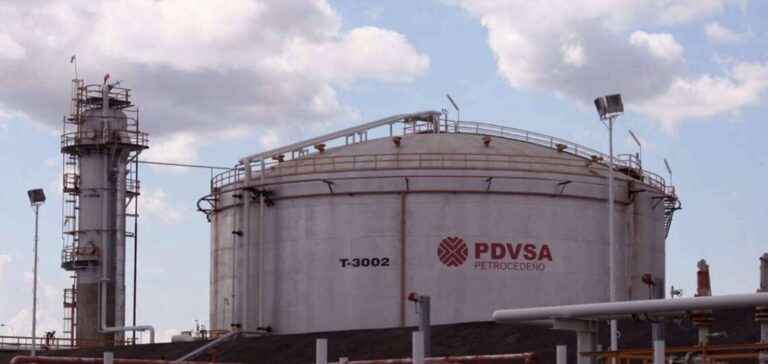The United States announced an easing of the oil embargo against Venezuela against the backdrop of Russia’s isolation, immediately after the announcement of the signing of an agreement between the power of Nicolas Maduro and the opposition in Mexico City.
The U.S. government allowed oil giant Chevron to partially resume oil and gas extraction in Venezuela minutes after announcing a second “partial social protection agreement for the Venezuelan people.”
In a statement, the Treasury Department authorized Chevron to partially restart its joint venture with state-owned Petroleos de Venezuela (PdVSA). Chevron must, however, ensure that “PdVSA does not receive any revenue from oil sales made by Chevron.”
Chevron has pledged to comply with the “imposed regulatory framework”, confirming that it has received authorization to resume part of its activities in Venezuela.
In May, Washington had already allowed Chevron to “negotiate” its possible resumption of operations in Venezuela, which represented a first departure from the embargo on Venezuelan oil imposed by Washington in 2019 in the hope of ousting Nicolas Maduro.
The United States is seeking to diversify its hydrocarbon supply to compensate for the loss of Russian crude as a result of sanctions imposed in response to Russia’s invasion of Ukraine.
Venezuela has the largest reserves in the world, according to some experts.
Washington welcomed the agreement in a joint statement with the European Union, Canada and the United Kingdom, which added: “We urge the parties to dialogue in good faith towards a comprehensive agreement leading to free and fair elections in 2024″.
No agreement on elections
On the substance, the power and the opposition agreed to undertake all necessary steps to release “legitimate funds” belonging to Venezuela “which are frozen in the international financial system.
This money will go to a “fund for the social protection of the Venezuelan people” to meet the country’s most urgent needs (health system, food, electricity network, education, response to the torrential rains that killed nearly 80 people in October).
For the design and management of this fund, both parties will request the support of the United Nations, according to the agreement read by a representative of Norway, the country mediating the inter-Venezuelan dialogue in Mexico City.
UN Secretary-General Antonio Guterres has “taken note” of the request for assistance, his spokesman said.
“The Secretary General welcomes the agreement” and “encourages” the parties to reach “new agreements that address the political, social and human challenges facing the country.”
Venezuelan President Nicolas Maduro welcomed a “step towards a new chapter” for his country, which must “continue to advance towards the peace and well-being that we all desire.
“Through this agreement, we will save more than three billion dollars”, estimated its representative in Mexico City, the President of the Parliament Jorge Rodriguez.
The “mission” of the opposition is “to obtain the democratic conditions for an alternation”, said its representative, Gerardo Blyde.
President Maduro is demanding the lifting of U.S. economic sanctions against his country, including the embargo on oil exports.
For its part, the Venezuelan opposition is demanding solutions to the “humanitarian crisis” and guarantees for “free and fair elections”, said Thursday a statement of the Unitary Platform.
There is no consensus on these elections which should take place in 2024, according to a source close to the file consulted Thursday by the AFP.
The opposition accuses Mr. Maduro of having been re-elected in 2018 in a fraudulent manner.
Poverty affects eight out of ten people in Venezuela, according to the Encovi National Survey of Living Conditions released earlier this month.
Seven million Venezuelans have left their country due to the political and economic crisis, especially since the death of former President Hugo Chavez in 2013.
The dialogue opened in August 2021 in Mexico City, after attempts that fell through in 2018 and 2019.
Nicolas Maduro suspended the talks two months later, after the extradition to the United States of Alex Saab, a Venezuelan businessman close to the government, who was prosecuted for money laundering.
The agreement of Mexico City on Venezuela represents “a hope for all Latin America” and “the triumph of politics”, congratulated the Mexican Minister of Foreign Affairs Marcelo Ebrard.
At the same time as the talks in Mexico City, Caracas has been hosting since Monday the resumption of negotiations between the Colombian government and the ELN (National Liberation Army), considered the last active guerrilla group in Colombia.





















